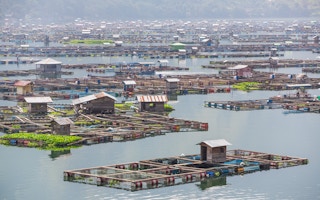When the sun rose over Indonesia’s giant Lake Toba on Wednesday last week, fish farmers saw that death in the night had visited their floating cages, and taken everything.
By Friday, millions of carp and tilapia had risen lifeless to the surface — ruinous losses for the aquafarmers.
The cause of death is not yet confirmed: government researchers are still analysing samples from the lake. But early signs point to a precipitous drop in the water’s supply of dissolved oxygen, the suspected result of both natural and manmade causes.
One cage owner said that a week before the die-off began, the fish in their crowded cages appeared increasingly limp, and could be seen gasping to the surface for air.
Now, hundreds of volunteers are using heavy equipment and plastic bags to haul the stinking carcasses onto land. A giant hole has been prepared for their burial.
Lake Toba occupies the vast caldera of an ancient supervolcano whose eruption some 75,000 years ago ranks as one of the most violent events in geological history.
Volcanic activity is not thought to have triggered the fish deaths, though.
Krismono, a professor who works for the government, pointed to unfavourable weather.
A lack of sun had shortcircuited oxygen production in the lake’s turbid depths, he said. It was possible that a mass of the depleted water had set off the catastrophe by rising to the top.
Overstuffed cages exacerbated the situation. “Cages should only have 3,000-5,000 fish, but these cages had 10,000 fish,” Krismono said.
Locals had also complained about water pollution, with some blaming aquaculture companies for contaminating the lake with uneaten food pellets and fish waste.
But the cages in Haranggaol, one of North Sumatra province’s biggest fish producing areas, are owned by individual small farmers.
“We can go bankrupt because of this,” said Hasudungan, a local aquafarmer.










